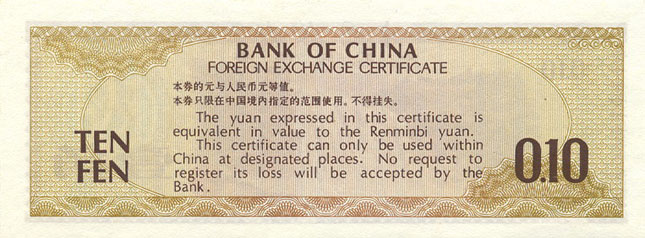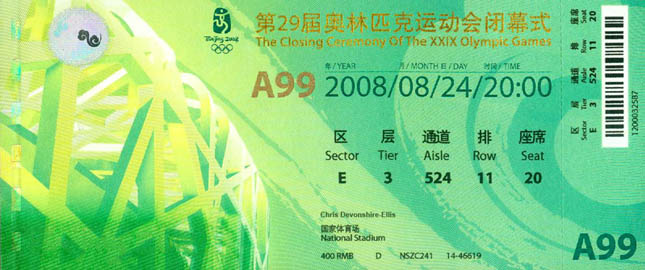Capitalism Prevails at Communist China’s Olympics
By Chris Devonshire-Ellis
Aug. 20 – With so much recent attention on China due to the Olympics, surprisingly little has been mentioned about the great strides the nation has made over the past twenty years from a dingy communist backwater of a nation to a modern, competitive country with a marked commercial edge. The Olympics in Beijing celebrate that momentous achievement, for China twenty years ago was a far different place.
Back then, foreigners weren’t even allowed to possess Chinese money, let alone have tickets issued in their names. Prices were controlled by the State, and commodity ration coupons were the order of the day. There would be absolutely no chance of being able to make a profit on any transactions. It was unethical, capitalist, and anti-society.

Foreign Exchange Certificates were the only money foreigners were allowed to use in China 20 years ago
How things change. Tickets for the closing ceremony, for which people were either given as an acknowledgement and thank you from the Chinese government or were also up for grabs via a postal ballot, cost either nothing (in our case) or a cover value of RMB400.
We got lucky, as did another 70,000 applicants. For most, the price of attendance at the event is an honor, yet how times change. Such tickets are being offered today (it’s sure to increase as the date nears) for up to US$6,000 each. Good old capitalism comes to China, what else did the world expect?
For us though, we’ll stay true to our roots. What’s given by the State, remains the preserve of the State, and shouldn’t be sold. Yet the temptation—a fat 6 G’s, no questions asked—is truly understandable. Goodbye, communist idealism; hello, capitalist opportunity making. I for one, will rather miss the old China as we strive on into the post-modern, post Olympics years of making money as primary objective. Such, I guess, is the nature of progress. If the Olympics marks a point of no return for the old communist, completely state-controlled days of China, a wistful glance back reveals that some of those ideals were not too shabby after all. A certain amount of honor came prior to rampant profiteering, and for that to be diminished in the modern Olympic China era, I personally find rather sad.

- Previous Article Olympic Soccer Helps Lift Shenyang Out of Rust Belt
- Next Article Tianjin Cements Its Position as Beijing’s Port City









